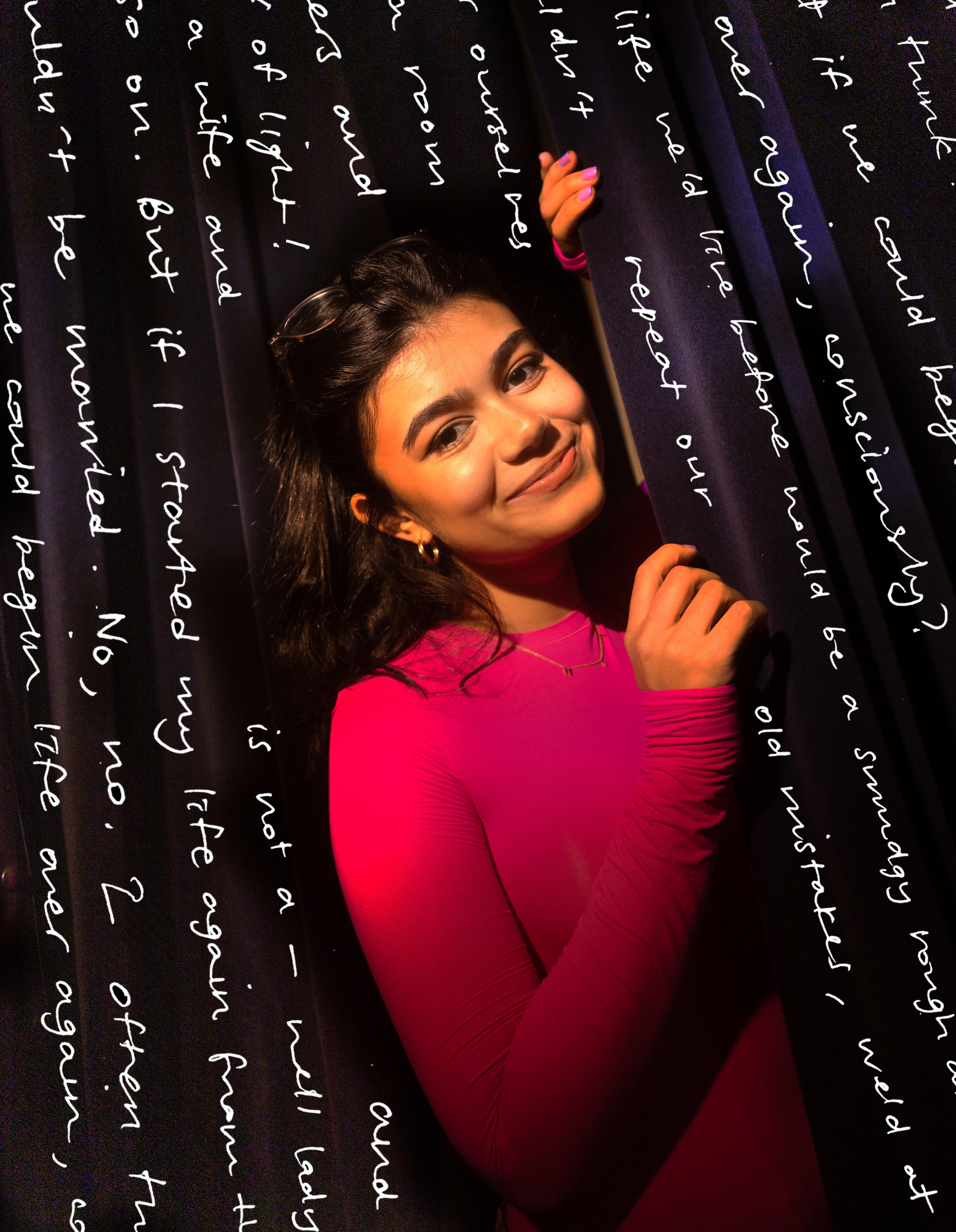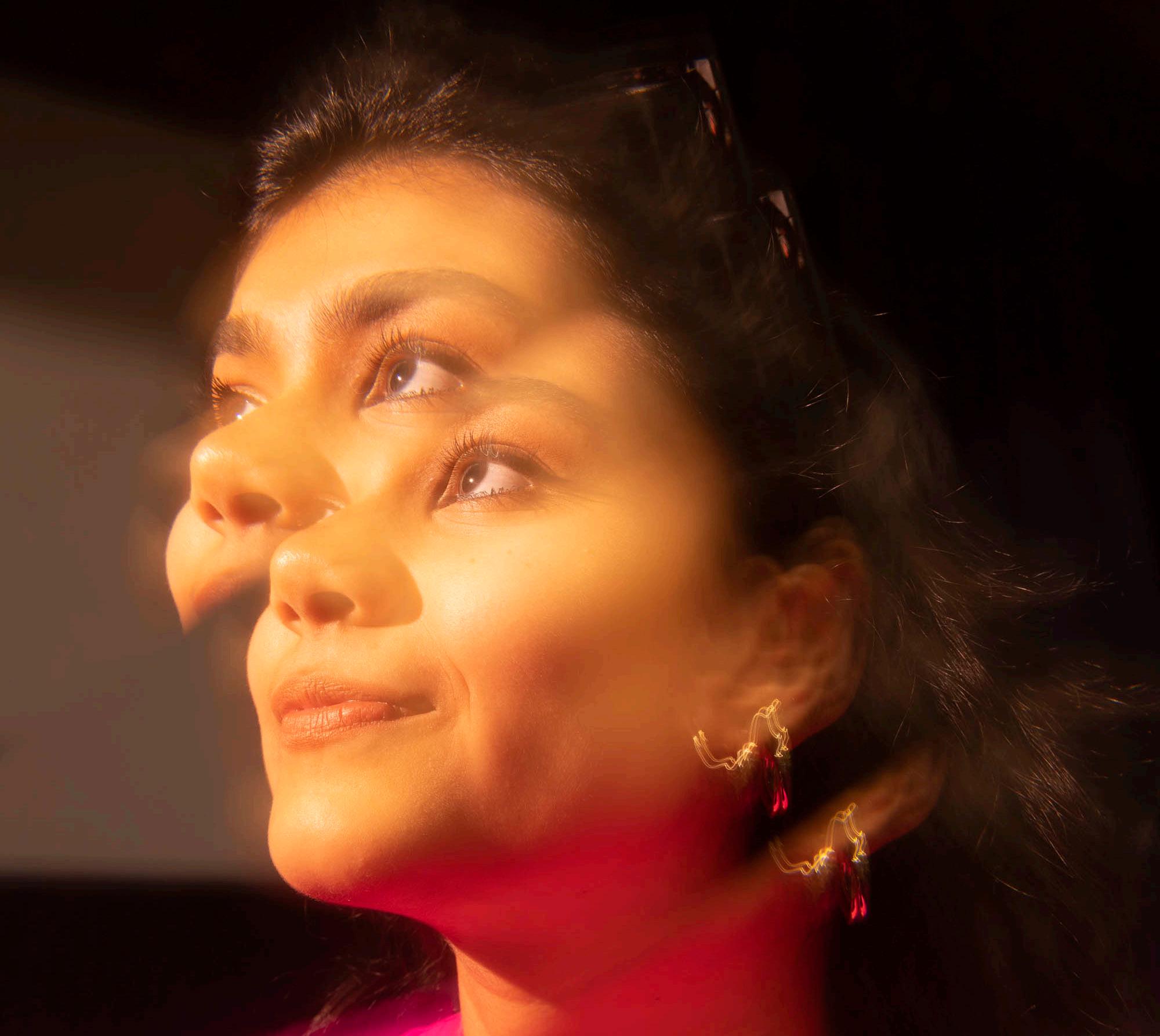prejudice’: e Students’ Union condemns LSE’s historic Stonewall exit

Minouche to step down, page 3
LSE’s 30 year relationship with British Petroleum, page 5
Features
e rst-years living at home, page 7
Consent Ed: what’s changed? page 8

Opinion
Jack Beeching Beaver Editor
Illustrated by Francesca Corno
On 17 January the LSE Students’ Union (LSESU) and Spectrum issued a statement condemning LSE’s decision to end its a liation with

Stonewall, the largest LGBTQ+ rights organisation in Europe. In 2019, Stonewall had ranked LSE as the 92nd most inclusive employer in the UK, based on its Workplace Equality Index.
LSE has also been a Stonewall ‘diversity champion’, meaning that the School received
consultations from the charity on ‘building an inclusive workplace’. In their statement, the LSESU and Spectrum argued that withdrawing from these schemes ‘has the potential to create an environment where gender prejudice and transphobic


language is justi ed under the guise of academic freedom.’ In response the LSESU has scheduled an ‘emergency town hall’ to take place on Tuesday 24 January. Continued on page 3

& WHAT’S ON BEAVER SOUND? SEE PAGE 13!

Prince Harry, please shut up! page 9
#Abolish eHomeO ce, page 11

Newspaper of the LSE Students’ Union: Making Sense of LSE Since 1949
‘Justifying
INSIDE TODAY News & flip for
hila davies’ DIRECTORIAL DEBUT
Read e Beaver. Online.
Meet the team
photographed by Claire Oh and Oluchi Egbom
Executive Editor
Aarti Malhotra executive.beaver@lsesu.org

Managing Editor Vani Kant managing.beaver@lsesu.org
Flipside Editor Ambre Pluta editor. ipside@lsesu.org
Beaver Editor Jack Beeching editor.beaver@lsesu.org

Multimedia Editor Vaneeza Jawad multimedia.beaver@lsesu.org



News Editors
Aysha Sarah
Klara Woxstrom

Features Editors





Alan Nemirovski


Bora Bayram
Opinion Editors
Alina Chen
Honour Astill
Part B Editors
Sana Agarwal
Anouk Pardon

Review Editors
Ben Helme

Syed Zaid Ali

Sport Editors
Noah Poll

Alex Bowley
Social Editor
Liv Kessler
Podcast Editors
Lily Whittle


Dillon Loh


Illustration Heads
Charlie To
Anoushka Guli
Photography Heads
Claire Yubin Oh

Oluchi Egbom

Videography Head
Jessy Yang

 Vaneeza Jawad Multimedia Editor
Vaneeza Jawad Multimedia Editor



The machine forces us to create. To create for consumption. Cool-girlaesthetic. Clean-girl-aesthetic. Vanilla-girl-aesthetic. Messy-Parisian-aesthetic. Rockstar-girlfriend-aesthetic. Downtown-girl-aesthetic. Until every little act (tucking your hair behind your ear, reaching for a lighter, painting your nails every weekend, even if they’re not chipped) becomes an act of identi cation, a little tag that testi es, “I promise
I consume!”, o ering neat compartmentalising means to our TikTok-addled brains.

When a girl speaks and she can sell you anything she learns the best way to hold you between her thumb and fore nger is by telling you what to like and what to love. Jeans, self love, and little pumpkin spice avoured treats? Out. Self help? So cheugy and unnecessary and out. Brought to you by the same little place, what’s in this year is… nothing. In fact, the campiest, most subversive thing you can do at a time where “pink pilates princess” is an actual, real phrase people
use to describe their Starbucks order is just… be normal. Scrambling to throw things together for seventy instagram likes (ten of whom are people who know we would be very upset if they didn’t tap the little heart, even if begrudgingly) is not our calling. Savour a regular, unembellished latte. Bench your Dyson Airwrap. Put down the Chanel No. 5. Shelve your half-unread copy of All About Love. And touch grass — Lincoln’s Inn Fields is so lovely this time of year! You have nothing to lose but the neat little label around your ankle.
as we churn out the last few remaining issues.
Aarti Malhotra Executive Editor


New year, new term, but the same old issues with our mighty Miss InDesign, of course. It’s almost as if seeing Matty Healy sucking on a fangirl’s thumb live last week wasn’t enough of a welcome into the ‘Winter Term’. But thankfully, while I possess the technical problem-solving abilities of a stu ed pepper, Vani is more than able to make for the
As our team re ected on how things went last term, and what we could do di erently going forward, I couldn’t help but question my competence as a leader. Am I doing enough? Where am I going wrong? Do I have it in me to do more and do better? Or will I let my team down?
But perhaps more importantly, I’ve been forced to think about the kind of legacy we want to cement and leave behind
Frankly, I don’t have de nitive answers just yet. All I know is that I want our team to know that all the hours and weekends they put in for this paper amounts to something much greater than the paper itself. And that their e orts are not unrecognised. And that although I am not entirely sure what other challenges this new term has in store for e Beaver, I’m con dent we’ll take them head on, together.
Bring it on, baby.
PHOTO OF THE WEEK
LT Week 02 www.thebeaverlse.co.uk 2 Bring it on, baby!
2023 trend forecast: de-in uencing, baby! Any opinions expressed herein are those of their respective authors and not necessarily those of the LSE Students’ Union or Beaver Editorial Sta e Beaver is issued under a Creative Commons license. Attribution necessary. Printed at Ili e Print, Cambridge Room 2.02 Saw Swee Hock Student Centre LSE Students’ Union London WC2A 2AE 020 7955 6705
de cit.
Front page by Vaneeza Jawad
ADVERTISE WITH US TODAY! For more information and rates, contact us at managing.beaver@lsesu.org
Scan this code on Spotify to listen to the newest Beaver Sound episodes!
submit your best shots of campus to photography.beaver@lsesu.org for a chance to win!
e Students’ Union condemns LSE cutting ties with Stonewall
Jack Beeching Beaver Editor
According to LSESU’s Community and Welfare O cer, Anaëlle oreau, “the SU has not been involved in any discussions regarding Stonewall prior to LSE’s decision.
“Now that the decision has been taken, LSE has told the sabbatical team to not inform students of their decision.
LSE’s withdrawal comes a er UCL became the rst UK university to cut ties with Stonewall in December 2021, citing threats to academic freedom in discussions of sex and gender. Since then, the Universities of Edinburgh and Glasgow have refused to submit applications to Stonewall’s 2022 Workplace Equality Index.
In a statement issued to e Beaver, LSE said that, “Following discussion across the School community, and careful consideration of the range of perspectives shared, LSE has taken the decision to not renew our institutional membership with Stonewall.
“ is decision does not detract from LSE’s unwavering commitment to LGBTQ+ sta and students and we will continue to build on our existing work to create an inclusive environment where every individual can thrive.
A Stonewall spokesperson told e Beaver, “As with all membership programmes, organisations come and go depending on what’s best for their inclusion journey at the time. We’re proud of our Diversity Champions programme which supports workplaces to create LGBTQ+ inclusive environments where all sta can thrive.”

LSE to change term names in the next academic year
Anya Saund Staff Writer
Illustrated by Mithalina Taib

At the start of this year LSE made the decision to change the term names and periods between sessions in order to make them more comprehensible, accessible and universally understood. ese changes will take place from the 23/24 academic year in order to amend systems and communications.
e LSE has stated that the academic session names Michaelmas Term, Lent Term and Summer Term will be
amended to Autumn Term, Winter Term and Spring Term, respectively. Additionally, Christmas break has been changed to Winter break, while Easter Break has been renamed to Spring Break. is decision was made by the School Management Committee following consultations and discussions which took place last term.
An LSE spokesperson told e Beaver that these changes were made to “use more accessible and widely recognised terminology, and better re ect the international nature of our community and our broader global engagement.”
Minouche Sha k to step down as LSE Director
Aarti Malhotra Executive Editor
On 18 January, via an email to LSE’s student body and sta , LSE announced that Baroness Minouche Sha k will be stepping down as LSE Director this summer. Sha k will be taking up a new role as the President of Columbia University.
In a statement, Sha k said, “It has been one of the greatest honours of my life to play my part and serve such a passionate and dedicated community who continue to inspire, support and learn from each other. LSE is a very special place and together we have achieved a great deal to make it an even more outstanding centre for teaching, research and positive impact on the world. We have also strengthened our community during challenging times and built a campus that is truly beautiful and world class.
“I want to wholeheartedly thank everyone for being such wonderful colleagues and students – I have enjoyed every day working with all of you. I must express profound gratitude to the School Management Committee, a team I am proud to be a part of, and Council, both cur-
rent and past members, for your excellent contributions, wise counsel and collaborative leadership during my tenure.”
According to the email, the process of choosing Minouche’s successor is “underway.” e email stated, “LSE’s Council has instructed a specialist search rm and appointed a committee to oversee the work. e process of appointing an interim President and Vice Chancellor will commence immediately.
Susan Liautaud, LSE’s Chair of Council, also commented, “As Chair of Council and on behalf of all members, I would like to express my sincere thanks to Minouche for her exceptional leadership of LSE. I am sure that all students, sta , alumni, partners and friends will join me in expressing gratitude for all that Minouche has done for our School, and we wish her the very best for the future.”
Minouche was a postgraduate student at LSE in 1986 and joined as Director in 2017.
News Editors Aysha Sarah Klara Woxström news.beaver@lsesu.org
3NEWS
e Old Curiosity Shop gets new life
Ava Waugh Staff Writer
Photographed by Oluchi Akudo
The Old Curiosity Shop is undergoing a heritage restoration project this semester at the LSE.

e Beaver has reached out to the LSE Estates Division to understand more about the renovations. LSE Estates commented, ‘‘ e Old Curiosity Shop was purchased by the School in 2017. When we acquired the property, it was tenanted and was vacated during the pandemic by the inherited tenant.’’
ey further explained, ‘‘One of the reasons for acquiring it was to protect it during the construction of the Marshall Building (as it was in a poor state of repair) and to integrate it into LSE’s university quarter, especially with the
pedestrianisation of Portsmouth St in 2020.” e renovations are said to include “essential repairs to the external envelope of the shop including a new roof.’’
Built in 1567, the shop is the oldest building on campus and is said to be the oldest shop in London still standing today, surviving the Great Fire of London in 1666 and the Blitz in 1940-41. Today, it is a heritage asset and a Listed Grade II* building. During the renovations, Sykes and Sons Limited, who are currently working with Dolmen Conservation & Joinery on the restoration project, discovered some unique artefacts through the renovations.
When asked how long the renovations may take, LSE Estates stated commented, ‘‘Completion is expected Winter 202223.’’
Lastly, regarding their intended use of
the Shop, LSE Estates expressed to e Beaver, “[W]e want to ensure it positively contributes to the life of the university quarter and we intend to bring it back
into active use. We will be inviting expressions of interest for the space in the new year.”
ousands of students sue UK unis for reduced teaching amid strikes, pandemic
Jessica Pretorius Staff Writer
Illustrated by Anoushka Guli
Students across the UK have long been unhappy about paying full university fees despite disruptions to teaching in the face of Covid lockdowns and frequent strike action. Now, more than 20,000 UK students are taking legal action against universities, seeking thousands of pounds of compensation through group legal action.
Student Group Claim is the organisation coordinating these claims and claimants are supported by a legal team from Asserson Law O ces and Harcus Parker Limited. In an upbeat animated video, the organisation’s website encourages students to ll out a simple form to join the group claim, estimating that some students will claim up to £5000. ere is no upfront cost, but if the claim is won, the lawyers will get 35 percent of the compensation paid.
e group believes that the contract between every student and a university, which is responsible for providing in-person tuition, access to facilities and various other services , has been repeatedly breached since 2018. Because of COVID-19 and strike action, many classes were moved online, access to facilities was restricted, and many students barely set foot on campus.
UCL was one of the rst universities to receive a letter of claim in April of last year, and in October around 3,500 UCL students had joined the claim. e High Court is to decide whether to issue a group litigation order against UCL on 2 February 2023. Other universities to have received letters are LSE, King’s College London and the universities of Manchester, Leeds, Birmingham, Warwick, and Cardi
LSE’s website states that the national nature of the strikes which occurred in November has been a big challenge. On how students can manage their studies during this time, the website refers to Moodle to look at readings and lecture notes, as well as LSE LIFE for guidance on how to succeed in studies. Furthermore, they suggest reaching
out to other classmates to ‘catch up’ and contacting your academic mentor if they are available. It also states that compensation cannot be ‘adequately’ considered as they cannot assess the full impact of the strikes. It further states compensation for the 2021-2022 academic year cannot be guaranteed.
e Beaver reached out to LSE in December regarding the lawsuit, but they said they were unable to comment on ongoing court cases. When contacted again in January, LSE stated that they are still unable to do so.
An LSE student, Victoria*, commented on her reasons for signing the claim, ‘‘I signed up to the claim because I think my rst two years at university weren’t value for money. Especially since the experience

I’ve had this year is drastically di erent from the experience in rst year, and to a lesser degree second year, it doesn’t make sense to me that I am paying the same amount for all three years. Also, whilst I’m a home student so my fees are much lower than for international students, 9k per year is a lot of money for me - I even debated even applying to university because the idea of getting into a lot of debt wasn’t very appealing…one thing that the student group claim mentioned was that if you receive any bursaries from your university (I do) this might a ect your claim, so I am slightly worried to see how that will pan out.’’
Victoria* added that, ‘‘ ere haven’t been many updates to the claim so far because I think they are working on the UCL case at the moment so I’m not sure what is going on with the LSE case. LSE also hasn’t contacted me personally about the case either. So I’m expecting it will take a long time, especially since LSE is a smaller university in comparison to other universities (the more people per university who have signed up, the stronger the case against the university).’’
isisadevelopingstory. e Beaver is further investigating the nature of the letter of claim submitted to LSE.
*Names in this article were changed to preserve anonymity.
4 News
LSE and BP locked into permanent relationship
Vanessa Huang Staff Writer
Illustrated by Noora Belcaid
Arelationship between LSE and British Petroleum (BP), sustained thus far for over 30 years, will continue inde nitely following an initial donation from the oil giant.
A Freedom of Information request made by e Beaver has revealed that LSE accepted £1.25 million from BP in 1990, with the funds used to establish the BP Centennial Professor scheme, a one-year visiting appointment.

e post is designed ‘to attract academics of outstanding international distinction’ in the areas of business policy, economics, nance, politics, and international trade. Alongside research and teaching at LSE, selected candidates are required ‘[t]o contribute to the internal education programme of BP and to develop contacts between the school and BP.’
e funds, received in £250,000 tranches over ve years, were donated to LSE as a permanent endowment, meaning the current agreement will remain in perpetuity.
is news comes as calls mount for universities to cut ties with fossil fuel companies. In a rst for leading universities, sta at the University of Cambridge are set to vote on whether future donations from fossil fuel companies should be accepted.
LSE has previously avoided sharing the sources of its nances, declining to reveal recent donations from fossil fuel companies in a 2021 open Democracy investigation. LSE cited an exemption to the Freedom of Information Act, saying this would “prejudice the commercial interests of the school, by making it more di cult to raise funds from private donors in the future.”
Apart from accepting donations from fossil fuel companies, LSE has also come under re for rejecting calls to divest from fossil fuels, as e Beaver reported last year, with 0.4 percent of its invest-
ment portfolio in 2021 exposed to coal, tar sands, tobacco, and controversial weapons.
LSESU Environment and Ethics O cer
Sophie Trott commented, “I think it is extremely concerning that this relationship is continuing in spite of LSE’s so-called ‘carbon neutral status’. It is disappointing that students are continually excluded from funding decisions that ultimately result in partnerships inimical to students’ values. Ultimately, this is just another example of LSE management failing to be held accountable to its environmental and ethical commitments, as well as to its students.”
An LSE spokesperson commented, “We are committed to making sustainability a key part of our investment decisions, and we will continue to review our policies and consider further steps and actions we can take, in line with the investment area of our Sustainability Strategic Plan.
“We recently published our new Environmental, Social and Governance (ESG) policy with input from the whole LSE community, including students.
UK universities to face 18 days of strike action
Chenoa Colaco Staff Writer
The University and College Union (UCU) has announced upcoming industrial action expected to take place for 18 days across February and March. A marking and assessment boycott has also been called to ‘strategically target the summer nals’. e union is demanding pay rises to combat the cost of living, better job security, lighter workloads, and pay equality. e rst day of strike action is set to be on Wednesday, 1 February. e UCU is yet to announce the other dates.
is response comes a er several negotiations between the UCU and the Universities and Colleges Employers Association (UCEA) over the last several weeks, wherein the UCU received an o er for an average of 2-4 percent salaried increase for their roles, in contrast to the UCU’s request for Retail Price Index (RPI) plus 3 percent. e request was labelled an ‘April Fool’s joke’ by the vice-chancellor body of the UCEA.
Alongside pay, the UCU has also been ghting for a 35-hour working
week basis for contracts, tackling gender and ethnic pay gaps, and abolishing zero-hour contracts. e UCU and UCEA will have further meetings on Wednesday, 25 January to continue negotiations.
e UCU General Secretary Jo Grady has said the UCU remains “committed to reaching a negotiated settlement”, but action will follow if employers “don’t get serious” in time.
Students have increasingly mixed views on the strikes. April*, a rst-year Philosophy student, has experienced strike action and believes the UCEA “should take teacher demands seriously”. April commented on how her teachers tried so hard to make up for the missing lessons, such as by adding extra o ce hours. “I do not consider it fair when dedication and hard work do not receive the pay they deserve,” she said.
While many students support the strike, others are turning away from industrial action. A self-described “jaded” thirdyear history student, Sam*, described his increasing disillusionment,‘‘I feel like my entire university experience has been demarcated by the pandemic and then these strikes. Even though I believe university sta deserve fair pay, the amount of strike action has really a ected stu-
“Since 2015, our investment exposure to tobacco manufacture, controversial weapons or companies which are signi cantly engaged in the extraction of thermal coal and tar sands, the most polluting of fossil fuels, has reduced by over 80 per cent. e total exposure of the portfolios was 0.6% in 2021-22 - 0.2% tobacco, 0.3% tar sands, 0.1% thermal coal and no holdings in controversial weapons.
“Our ESG policy will continue to involve selecting externally managed funds that minimise indirect investments in the worst-o ending sectors. It also sets out to support companies aligned to rigorous net-zero/climate targets and divestment from those that are not.”
dents and has barely made a dent in management.’’
He also believes that as a History student, he receives disproportionately worse treatment than some other students. ‘‘It’s no secret that the History department is a lot smaller and funded less than others, but it’s really obvious during strikes. For some Economics classes last year, teachers that went on strike were replaced by a substitute so their learning wouldn’t be disrupted. For us, we just got 3 weeks of no classes.’’
When asked for his opinion on the negotiated tiered 4-5 percent salary increase, he said, ‘‘ e amount of damage these strikes are causing are honestly not proportional to the reward.’’ He later described the situation as ‘‘overall just bad for everyone’’, including students who are ‘‘unfortunately stuck in the middle.’’
Other students, like third-year History and Politics student Reem Ibrahim are “livid” about the second round of industrial action this academic year. Appearing on GB News, she argues, “I do understand the pay cuts are di cult but we’re in the middle of a cost of living crisis and our students are bearing the brunt of these strikes.”
ird-year Economics student, Dania thinks students can play a much larger role. ‘‘ e amount of strikes happening across the nation and other industries have made us treat them like they’re just a normal part of our days now. is defeats the point. We are being targeted because we are the consumers and if the consumers are unhappy, universities will notice.’’ Dania believes students need to ‘‘make more noise’’ especially in regards to paying fees, which can be done through ‘‘emailing and social media.’’ Dania concluded, “As students, we are the ones in power.”
An LSE spokesperson commented, ‘‘In line with other universities, we are awaiting further detail on strike action and relevant dates, but the School will do its utmost to mitigate the impact of strike action on both the provision of teaching and the student experience.
“ e School regularly updates a dedicated industrial action webpage with information regarding studying during strike action. For further support, students can also nd a range of resources, information and relevant contacts in the Support Map.’’
*Names in this article have been changed to preserve anonymity.
News
5
FEATURES
“ e feeling of being missed”: home, nationality, and belonging at LSE
Liza Chernobay Staff Writer
Illustrated by Charlie To

As London’s pubs serve the final rounds of mulled wine and Somerset House disassembles it’s famous ice rink, LSE students are slowly entering the flow of city life after the winter break. With most of the Christmas decorations gone, the previously illuminated LSE campus seems grey and alien, evoking nostalgia for the warmth and relaxation of home.
‘Home’ has a variety of meanings: it is at once a feeling, a place, a symbol of family and friendships, and a basket of memories. Despite its vast symbolism, ‘home’ is integral to creating a sense of belonging, comfort and happiness, so understanding where ‘home’ is and how one can feel ‘at home’ is crucial, especially for university students learning to lead independent lives.
Many LSE students associate the idea of home with their families, friends, and warming memories connected to spending time together. For Will, a first year History student, home embodies “the feeling of being missed” by those close to his heart, including his beloved pets After all, he says, “you can call your parents any time, but you can’t call your dog!”
Moreover, home is a physical and cultural base. This could be a house where one spent their childhood, a familiar neighbourhood or a country to fight for. Attachment to a place is especially evident for Eva, a French-Ukrainian student, who has lived in six countries throughout her lifetime, spending the eight years in Ukraine. The “familiarity with the streets” of Kyiv, she says, makes her feel “at home” like no other place – walking down the familiar routes, frequenting favourite cafés and discussing memories of home with Ukrainian friends
makes Eva truly “happy”. Together with geographical location, the languages we speak with family and the foods and smells we grow accustomed to all shape cultural identities, which are fundamentally related to individual perceptions of ‘home’.
Attempting to recreate the warmth and sense of belonging to home at university, many students turn to their cultural and national identity.
“Moving to a different cultural environment often causes you to become more attached to your own culture, values, and nationality in order to preserve [your identity]” says Eli, a third year student from Austria. “[The need to clarify where I’m from at university] made my national identity stronger in my head”. Nation ality can therefore not only symbolise home and their ‘old lives’ for stu dents, but also be come a treasured marker of individ uality and a token of group belong ing.
Alberto and Eva strongly sug gest the need to “make use of [your] cul ture” to feel closer to home while at university. Throwing a pasta party or teaching your friends how to make vareny ki (Ukrainian dumplings) can promote cultural roots and equally create opportunities for connection with friends who share cultural backgrounds. After all, the students agree, there are few things that create a homely comfort better than the pleasant aftertaste of a homecooked meal. Additionally,
Eva claims that joining a national society at LSE helps her feel “less alone” and creates a “support group” for when she is going through difficult times.
However, not every student at LSE has a luxury of knowing where they come from, turning the process of fitting in to a national group an onerous task for many. For ‘third culture kids’ – people with a mixed national and cultural background – nationality is usually not a marker of belonging, identity, and home. Some ‘international kids’ often feel like “outsiders” when trying to make friends at university, as they don’t easily fall into one national category.
According to Francisco, a
like-minded individuals, situations where national identity is ambiguous can create tension and slow down the relationship-building process. Nationality is seen as a “big part of [your] personality, your essence”, says Francisco, as well as symbolic of behaviours and traditions associated with national groups, all of which helps humans understand the unfamiliar others.
At first glance, growing up without a set home and clear national identity is a big challenge for young people. “[When you move around a lot], you miss out on milestones with people”, says first year student Tallulah, so you can’t relate to “childhood experience” and make bonds with people based on nation-
ty, symbolically removing the “right” to say you come from
tural experience which I don’t feel like I’ve really had”, shares Will, “[so I feel like an] impostor” ifality. Notions
ing comfort at university and building meaningful friendships? According to Eva, a “mixed cultural identity” makes you more open-minded and brings up creative opportunities to “connect with people” by drawing from a unique catalogue of linguistic, cultural, and geographical experiences. One can also make “the fact that [they] don’t identify anywhere [their] identity,” suggests Tallulah, opening a novel perspective on what constitutes identity and ‘the self’.
dent, “when people meet me… they always try to pinpoint exactly who I am…It is uneasy for them to not know where I come from”. While it is human nature to ‘catalogue others’ to find
ency, school systems, shared memories, and political insights all shape national awareness and identity. They might come naturally when you live in one place, but are hard to develop when stretched across rivers, borders, and continents.
However, is fitting in to a ‘national box’ essential to find -
Ultimately, shared and individual identity are not bound to nationality: there are many ways to voice your heart and find belonging, such as pursuing “specific interests” like playing bass guitar or joining the LSE Beekeeping Club. It feels “oddly illuminating” to find people who share your “niche” interests at LSE, which is “just as meaningful as living on the same island, in the same capital city,” according to Will. At the same time, the multi-cultural nature of London and LSE makes it “the best place to not belong to any country” because you are not tied down to any identity. In London, a student can experiment and be whoever they want – an underrated privilege of being an LSE student. While occasional homesickness and yearning for precious moments with family are inevitable for students returning to independent livelihoods at university, it is in their power to recreate the comfort, ease, familiarity and love which home represents. “Having a consistent set of goals and values” is central to maintaining a “sense of continuity” and avoiding the loss of oneself, explains PPE undergraduate Anastasia, emphasising the integral role of ‘the self’ in providing the care and consolation a student might require. In the words of Jack, a third year student, “home is where I am”. It is therefore in our hearts, and we can access it at any place, time, and season.
Features Editors Bora Bayram Alan Nemirovski features.beaver@lsesu.org
6
-
-
guage -
e truth behind living o campus as a rst year
Francesca Corno Staff Writer
We enter university on the promise of nights out, laughter, and a freshers u that is ohso-worth-it. Living on campus is the beginning of adulthood, an opportunity to understand yourself, gain independence as you learn how to cook, and try not to lose all your cutlery in the rst week. You distance yourself from home (even texting on the family chat is minimised) and focus on your new life objectives: interacting with peers and discovering the joys of being young and carefree. But what of those who don’t distance themselves? ose who choose to remain at home? And is it even a choice? Does the possibility of a social, lively experience slowly fade from our university life?
e short answer, thankfully, is no.
On the contrary, most LSE students gushed about their o campus experience, its convenience and practicality, assuring me that they did not regret the choice they made — and would gladly make again. Yet what is the true o -campus experience?

e nancial bene t of staying at home prevails above all else as the main motivator. Many students from London have found themselves unable to justify the cost of living at university when they could simply travel to LSE. With the current economic crisis and maintenance loans failing to rise in line with in ation rates, living at home becomes the natural and obvious choice for many. is comes alongside a judgement of LSE accommodations, with Sveva Lugnani, a rst year History student, asserting that living at home was simply “better value for money when compared to living standards on campus.” e familiarity and security of one’s home is understandably preferred to a plain university accommodation, allowing for some comfort and a fridge full of food, as freshers start this new chapter in their lives.
Where money was a clear rea-
son to live o campus, a more unexpected advantage also came to light: time management. A couple of students from di erent years and departments agree on the necessity of detaching their university selves from their home selves, creating an academic work/life balance. e process of travelling in and out of LSE facilitates the ability to relax and distance themselves from the stress of university work and central London. It also provides a great opportunity to learn time management as a student, a valuable skill later in life. A second year Geography student, who preferred to remain unnamed, re ected on her time spent on the Tube as she travelled into university, telling me that “the commute gives [her] the opportunity to read ction a er a long day of lectures”. is separation is easier felt when one does not live with other tired and stressed 18-year-olds, all panicking to complete their latest assignment.
e ultimate worry preceding the decision to live o campus is socialising (or lack thereof). Students fear being at a social disadvantage as a result of not
living halls, which can seem like the perfect space for mixing. Especially during freshers, where events tend to be closer to campus, those living at home are likely to feel somewhat isolated as they uctuate between the party environment and home. However, in the long term, most say the worries they experienced were unfounded. “I don’t think that living at home has had a negative e ect on me like I initially thought it would,” says Sabaa Pasha, a rst year Economics and ISPP student. e key to a good social life is being proactive, Pasha also asserts, to encourage outings in order to forge friendships. e living arrangement can be a social disadvantage, but only if you let it.
Although the myth of a diminished social life and fewer friends has been disbanded, this arrangement has clear caveats. Despite providing extra time to work and unwind, travelling can become an irksome issue on nights out, as I quickly found out as the year began. “When’s the last train?” I had to ask myself, “How am I getting home?” Where living o campus provides for comfort
and serenity, accommodation creates a sense of community and companionship - everyone goes home together, so going out becomes easy and accessible. Living at home provides the
ond- and third-year mentors turn their focus to work, the scheme becomes ine ective. Departmental events and societies can pick up the slack, as they provide plentiful opportu-
opportunity to learn how to get organised, but at the expense of that last joke, or that last dinner. e fear of missing out can sometimes get to you.
And what of LSE’s O Campus Support Scheme, the system meant to aid students living at home? e programme matches rst years to a student mentor, with the purpose of facilitating and connecting students who do not live in halls. ough great in theory, students say its execution is lacking. All agree that emails are occasional and meetings between mentors and mentees are scarce: it can prove to be useful at rst, but as sec-
nities to meet new people both within one’s eld of study and interests, as well as a chance to talk to new people.
Living o campus is a new experience as much as living in halls is, lled with opportunities, insecurities, and choices. Although the glori ed ideal of a late-night chat in the common room with friends is not viable, that does not make or break the university experience. On the contrary, when asked whether they regret their choice to live at home, the answer was unanimous: no.
Features
7
“On the contrary, most LSE students gush about their off-campus experience, its convenience and practicality, assuring me that they did not regret the choice they made — and would gladly make again.”
Zofia Gimblett Staff Writer Picture courtesy of the LSESU
For the second year running, Consent Ed stands as both a triumph and proof of the obstacles that continue to stand in the way of building consent culture at LSE. Launched by the student-run Hands O campaign in September 2021, Consent Ed was created with the intention of opening up the conversation about sexual violence among students to combat the shamelled silence that o en discourages victims from seeking support.
With a focus on empowering students to become active bystanders in situations where sexual transgressions may occur, the program consists of an online course and an hour and a half in-person session where trained student facilitators teach the ins and outs of consent in the context of British law. Participants are presented with high-risk scenarios to test their knowledge of consent and are informed of the services available inside and outside of LSE for survivors of sexual violence. According to one workshop facilitator, David Jehlicka, “three years ago, we didn’t have workshops, so there is an improvement,” but, “it’s just not
of residence in September and October 2022 were cancelled. A small number of cancellations were due to disruptions caused by Queen Elizabeth II’s funeral, but most were because no students signed up, David claims. Facilitators ran workshops even if just one student turned up, but the Consent Ed database records that 35 out of the 94 in-person sessions planned to take place on campus and in halls were cancelled.
is is partly down to bad communication between halls and the SU. Some hall sta claimed to have been noti ed of sessions only an hour before they were meant to happen. Although, facilitators suggest that even in cases when halls were informed in advance, the promotion of Consent Ed within halls was not energetic enough to secure substantial student sign-ups.
In contrast to last year, the SU has made Consent Ed optional this year. e SU website states that halls residents are “expected to attend if they feel able to”.
On the one hand, by leaving students free to choose, the SU has resolved the issue of catering to individuals of di erent experiences, especially those who have already encountered sexual violence in their lives. is year’s program includes survivor-led workshops and the option to opt out altogeth-
letic Union’s Carol is a striking example of leniency: a massive all-day drinking fest in the penultimate week of Michaelmas term, for which AU members are meant to complete Consent Ed. However, many students were allegedly allowed to attend with no Consent Ed training, though the reasons for these occurrences vary and remain speculative.
Moreover, an anonymous source told e Beaver about residents in halls ‘QR-code sharing’ in the last academic year. One person would take an unauthorised photo of the QR code, which students are asked to scan at the end of sessions to mark their attendance and would let people outside the workshop scan it. is allowed innumerable others to add their names to the list of people who have completed Consent Ed without ever coming to a single session. Perhaps a return to old-fashioned pen and paper is the remedy.
good enough yet.”
Attendance this year has been low. According to David and Consent Ed facilitator Zoé Vanhersecke, the reasons lie between poor LSESU organisation and a lack of student engagement, even subversion. While the quality of Consent Ed workshops is higher this year thanks to mandatory twelvehour summer training for all facilitators, nearly half of sessions scheduled to take place in halls
er. On the other hand, some facilitators argue the opt-out option is used merely as an excuse by many to get out of the workshops.
Students have also created loopholes to avoid participating in Consent Ed. Training remains nominally obligatory for students who want to become committee members of any SU clubs or societies, but numerous students con rm this is rarely enforced. e Ath-
A 2019 survey of 1,000 students in the UK revealed that only a quarter felt su ciently prepared by earlier sex education to understand sexual consent properly. In the wake of the ‘shadow pandemic’ of intensi ed domestic violence during Covid lockdowns, Rape Crisis Centres saw a rise in requests for counselling for victims of sexual violence in every month of 2021. Just a year a er the subsequent spiking epidemic of the winter of 2021, sexual violence remains a serious problem. Moreover, al-
though 62% of students report experiencing sexual violence at university, four in ve cases go unreported.
e disparity between the prevalence of sexual violence and the number of reported cases indicates dismal student condence in reporting systems and students’ frequent inability to admit when consent has been violated. Consent Ed solves the latter. It empowers students to recognise when sexual violence occurs, teaching us how to prevent it from happening as active bystanders. Although the former is yet to be xed, providing tools to reach out for help is crucial to improving student safety.
Consent Ed also challenges LSE’s lack of commitment to encouraging sexual violence reporting. LSE’s online ‘Report It, Stop It’ form is lengthy and, according to Zoé, “makes you want to give up.” Firstly, instead of creating a form speci cally for sexual harassment, like in other UK universities, the form at LSE addresses bullying, harassment and sexual violence as one category, like all other LSE online resources. Secondly, it is unclear if any action will be taken a er a student makes the report. e form seems to ask victims everything — their ethnicity, religion, and the circumstances of the incident — except the name of the perpetrator.

Zoé speculates that as soon as an individual is accused, disciplinary action must be taken,
something the university does not want. Disturbingly, until this year, LSE encouraged victims to sign Non-Disclosure Agreements to prevent word of sexual harassment within the university from spreading. Only in October 2022 did LSE pledge to stop using them. e university leadership’s policy of sti ing conversation about sexual violence impedes proper feedback on the e ciency of the School’s response mechanisms. Consequently, this not only leads to a lack of con dence among students in reporting incidents when they happen but also perpetuates tolerance of sexual harassment and violence, so long as it does not cause a public scandal. When speaking with Zoé, her de ance shone through: “LSE buries reports. at’s why I’m doing Consent Ed.”
In the triangular relationship between LSE, the SU and students that build consent culture, we certainly will not be receiving encouragement from the university to talk openly about or report sexual violence. Increasing student agency through Consent Ed is, therefore, all the more signi cant, even in spite of this year’s lagging student enthusiasm. e hope for next year is recognition by students of the power of attendance.
Features 8
Despite calls for change, Consent Ed is still not doing enough
According to one workshop facilitator, David Jehlicka, “three years ago, we didn’t have workshops, so there is an improvement,” but, “it’s just not good enough yet.”
A plea to stop hearing from Harry
Honour Astill Opinion Editor
Iinitially suspected the outcry towards Meghan Markle (and Prince Harry) was just another manifestation of the broad du jour – a woman who everyone loves to hate – à la Amber Heard and Hilaria Baldwin. Women who, for some vague reason, have generated whole Twitter and Reddit communities dedicated to dissecting their every move in order to bolster their perception that so-and-so woman is bossy or conniving. Men like Piers Morgan and Jeremy Clarkson, and innumerable women –no doubt neglecting to work through their internalised misogyny – seem to take to Meghan in particular as their scapegoat for the Prince’s unceremonious exit.
I’m not one for celebrity gossip, but the impression I had gathered – back when it was a choice in hearing about Sussexes or not – is that she is perceived by her nay-sayers as manipulative and ‘gold-digging’, taking advantage of the stupid, but well-meaning, Prince. I, of course, am loath to hear about any narrative which unfairly minimises the agency of men to instead cast all blame on women.
I was particularly revolted by Clarkson’s infamous piece and the countless offensive tabloid pieces about Meghan, like the Mail’s ‘(Almost) Straight Outta Compton’. But, having been forced by my family to watch their six-hour long documentary over the December break, I have found that such criticisms have been entirely misplaced. Instead, it is the Prince who comes off as deeply unlikeable, ignorant, and generally ridiculous.
You’ll have to allow me to indulge in a bit of celebrity drivelling. Choosing this nonsense to christen my first piece felt appropriate having gone home to Australia and witnessed the dwindling support for the monarchy among Commonwealth subjects firsthand. I suspect this has only
become more pronounced with the passing of the Queen – because who wants their Head of State to be a man who was once so down-bad that he said he wanted to be a tampon?
Regarding the documentary, the narrative is as insubstantial as Harry’s thinning red crown. Throughout the middling first half, they seem desperate to prove to the audience that they really are so in love, to an extent that comes off as cloying and insecure. This is perhaps understandable, given the unfair perception of Meghan as a ‘gold-digger’, but what it actually elucidates is that they seem so far-removed from how real people actually talk; at one point Harry actually tells the audience that ‘this is a great love story’ At certain points they almost lend credence to theories about elites being reptiles (perhaps a familiar feeling for some of us at LSE?). He dances around the dramas of his departure, evidently careful to not burn bridges and name names, but what rapidly becomes apparent is that the documentary is mostly just an exercise in airing old grudges with Harry’s brother, father, and the media which has done oh-so-immeasurable damage to his private life.

Instead of desiring privacy, however, they both come off as desperately obsessed with curating their own image, so much so that everything else is called into question. Accordingly, he occasional flashes of contempt on Harry’s visage towards Meghan’s off-the-cuff comments appear rather disturbing.
It is not unexpected that a documentary produced by themselves would be biassed in their favour, but the documentary is transparently one-sided, self-aggrandising, and seeks to offload blame onto anyone except themselves; all of this is not only deeply patronising to the viewer but also yet another illustration of how deeply outof-touch Harry and the people who have somehow put this on my TV screen actually are.
Harry can’t decide if he’s left the Royal Family for moral objections or for personal grudges, and I don’t think he even knows himself. Halfway through, we witness a pigeonholed section in which we are explained how the Commonwealth is ‘Empire 2.0’, and how the Monarchy is inextricably tied to its imperial past. Yet, they never fully flesh out this actually intriguing point; it has the pungent air of someone trying to throw shit at the wall and see what sticks. In a similar vein, he discusses how his ‘internalised racism’ led to his erroneous decision to wear a Nazi uniform to a costume party, but how he ‘spoke to’ the Chief Rabbi
of Britain and, I suppose, discovered Nazis were bad and not funny? Somehow, I suspect, by 21, many of us don’t need to be told that this is an inappropriate look for AU Carol. For all of Harry’s harping on about being barefoot in Lesotho and his drunken tattoo of Botswana, he has nothing substantial to say about his very real personal and familial racist past.
What’s clear is that, no matter how many titles he is stripped of, Harry is as out-of-touch and narcissistic as you would guess an embittered Prince would be. Perhaps the most personally offensive part of the documentary consists of when the pair whinge about their tenbedroom royal cottage being ‘so small’. Harry also complains about the King ‘cutting him off’ upon his departure from royal duties, which I feel like shouldn’t even be the term anymore when you’re pushing 40. To me, it seems obvious that no longer contributing to a country – or even living there – should not entitle you to absorb millions of its tax pounds. After all, it was the British public –whom the documentary is eager to paint as irredeemably racist, bigoted, and backwards – who financed their £32 million wedding whilst many, even the poor and infirm, go without heat this winter. When I searched for a flat in London with my budget only turning up car parks, Harry and Meghan moaned about the trauma of having to shack up in an L.A. mansion thanks to one of their celebrity (no doubt parasocial) friendships.
Although they note the Royal Family's charity work provides them a convenient alibi for the massive expropriation of wealth, the pair talks extensively about their nondescript charity projects, which seems to mostly consist of attending panel discussions, being on Zoom calls, and interacting with unimpressed African children. Their actual humanitarian achievements remain an unknown quantity to me. The depiction of Meghan as some revolutionary princess also eludes me; much of the first half is dedicated to discussing how the (racist?) British public were oh-so taken by Meghan. What is obvious is that Harry remains nonetheless deeply entrenched in a belief system of superiority and exceptionalism, but this time one in which his and Meghan’s love can conquer racism and imperialism, despite failing to acknowledge in any meaningful ways the very histories placing him on our screens in the first place. Ultimately, this is the bastard product of enriched celebrities and opulent royals appropriating real causes (many of which directly result from economic or colonial exploitation) for PR purposes, as most in the public eye are wont to do.
It’s great that Harry and Meghan have, in their own words, finally taken their ‘freedom flight’. But I thought this would imply we could hear less from them. With the release of Harry’s new book, I now know more about his frostbitten penis, kill-death ratio, and mummy issues than I ever could have wanted. The Queen was able to win the hearts of many in part due to her enduring strategy of being silent and letting the public perceive her as they pleased. Harry should take heed, because hearing him speak can turn the passively sympathetic into the actively revolted.
OPINION
9
Opinion Editor Honour Astill Alina Chen opinion.beaver@lsesu.org
Soup throwing and the curse of performative activism
 Sam Eaglesham
Contributor
Sam Eaglesham
Contributor
Photo from The Guardian
On Friday 14th October, members of the climate activist group Just Stop Oil threw soup over Vincent van Gogh’s famous painting Sun owers in an attempt to draw attention to government inaction over climate change. Cue outrage and hysteria. e usual suspects piped up: Piers Morgan decried their actions as ‘childish, petty vandalism’, whilst Daily Mail coverage described the group as perpetuating a ‘relentless campaign of chaos’ Never mind the climate crisis, never mind our addiction to fossil fuels, never mind the crippling decline in our living standards that climate change threatens – how could those heartless activists threaten a priceless painting?
e actions of the group are murky territory for those who consider themselves rm supporters of the climate cause, but also ne upstanding citizens respecting law and order (and perhaps with an appreciation for art). Yes, they acted in admirable spirit, but it is dubious as to what Just Stop Oil succeeded in doing, other than irritating the gallerygoers of the world. ough I
movements which had come before it. rough civil disobedience, from blocking roads to blockading oil facilities to vandalising businesses (and paintings), the aim of the group is to force the government to commit to completely stopping all fossil fuel production. roughout their brief existence they have
our governments to address the problem, but it is debatable whether this publicity has led to any kind of tangible change. e group is essentially a lightning rod for outrage merchants, another example of ‘wokeism gone mad’ to point and yell at. Besides, will more media attention really achieve anything at this point? It is fair to say that the British population is well aware of what troubles are brewing on the horizon: preceding climate protests, in particular the school climate strikes, have made sure of that.
(notwithstanding the fact that all the paintings they’ve targeted have been behind glass). Nor is it that they have somehow alienated people from the cause itself; the absurd idea that the Just Stop Oil campaign has upset moderate supporters of climate action so much that they give up environmentalism altogether.
e real problem is that the group’s methods bring them no closer to achieving their aims. Does anyone honestly believe that the actions of Just Stop Oil will lead to change?
e answer, I’m afraid, is no.
current government – yet the solution cannot just be to wait for the next general election in the hope that Keir Starmer’s moderatism will deliver the changes needed to tackle the climate crisis.
can admire an activist group which acts peacefully outside the bounds of the law to make a political point, what did the group really believe they would achieve? rowing soup at a painting appears nonsensical, an act purely dedicated to provoking annoyance; and despite my sympathies towards the group, it is Just Stop Oil’s ine ectiveness which is the most notable thing about them.
e Just Stop Oil campaign began in April of 2022, in the same spirit as the Extinction Rebellion and Insulate Britain
been controversial, praised for their well-meaning intentions but attacked for their methods; Just Stop Oil disrupts the lives of everyday people, but it is never quite clear how the group’s aims are advanced through this disruption.
If we are generous to them, Just Stop Oil perhaps succeeds in keeping the issue at the forefront of politics by disrupting and drawing media attention in new and increasingly outrageous ways, exposing to the public the comprehensive failure of
Here we reach the crux of the problem: though such stunts are invaluable in exposing the plight of lesser-known causes, climate change is not a ‘lesserknown’ problem. We know we must act against climate change quickly and we have known it for years, and yet still action is lacking – a series of protests blocking roads and vandalising art is not going to suddenly open politicians’ eyes to the crisis we are sleepwalking into, and the group’s campaign risks placing more focus on their methods, not their cause. e problem with the Just Stop Oil movement isn’t that they have ‘brutalised’ countless paintings
However, a deeper underlying problem arises in relation to this issue – what does an e ective climate activist group actually look like? Perhaps the greatest task for contemporary climate groups is to overcome the overwhelming disconnect between public opinion and government action. People think the government should do more to address the climate crisis, but this sentiment has a minimal impact on government policy. Part of the problem is the disposition of those in power against radical climate action, and there is admittedly little activists can do to change the minds of the
We need protests, we need climate activism, we need cries for change, we need to do all we can to put the emphasis on tackling the climate crisis, but it needs to be done carefully; not isolating people but instead building a consensus behind a concrete and comprehensive strategy voters can rally around. ough politicians might still reject the need for more radical climate action, at least we would have a real alternative to the passivity we currently face, a clear route out of the mess we are in. e stunts of Just Stop Oil risk being a distraction that takes attention and energy away from the overwhelming seriousness of the current situation. Instead of fringe demonstrations that achieve nothing, activists must focus on inspiring, on creating real leadership and lling the space that ine ective politicians have le empty. Only then do we have any hope of change.
Opinion 10
“The stunts of Just Stop Oil risk being a distraction that takes attention and energy away from the overwhelming seriousness of the current situation.”
#Abolish eHomeO ce Redux: Britain’s ongoing refugee crisis
Kieran Hurwood Contributor
In Rishi Sunak’s rst televised interview of 2023 on 8th December, the new PM blundered through veteran BBC politico Laura Kuennsberg’s questioning, trying hard to deny crisis and downplay his personal political weaknesses. is was not the rst time, over the Christmas period Sunak had been criticised for asking a homeless man if he was ‘interested in getting into’ the UK nance industry, and faced attacks from the new organised ‘faction’ of the right in the Conservative party. In that interview, Sunak was explicitly asked ‘why would anyone under 50 vote Conservative?’, Sunak’s response was that they were dealing with NHS backlogs and…small boats?

is article is mostly about Britain’s ongoing manufactured refugee crisis, but it’s also about the British government’s rhetorical and administrative decline in recent years. In an article I
the time I had not necessarily anticipated the issue’s incessant leakage into political discourse that has occurred throughout the last 8 months of government crisis. In fact, this crisis –while apparently moderating Tory rhetoric – has led antiimmigration extremists within the Conservative party to become bolder and more in uential than ever before; causing even the PM to claim that the public hate ‘small boats’ because it is ‘unfair’. Yet, following Brexit and massive underinvestment in most public services, we remain unable to deal with the problem in any reasonable fashion.
e truth is that now the situation – particularly on asylum – is far worse. is di cult winter has deeply impacted refugees, with poor heating, disastrous disease control, and shrinking space for asylum seekers in processing camps, such as the Manston processing facility. Being short of space in their camps, the Home O ce has been spending extortionate amounts on privately-run hotel
of January, when a video was released of Suella Braverman being challenged by a Holocaust survivor on that very rhetoric. Indeed, last year saw the highest number of refugees attempt to cross the Channel in over a decade, with over 45,000 asylum seekers making the dangerous journey. However, following this, the Home O ce has made no obvious e ort to accelerate processing of individuals’ asylum claims beyond their proposed ‘New Plan for Immigration’this controversial plan includes measures to send refugees to Rwanda and Albania, practices they advertise to the world through their Twitter account.
Amid all the present crises, we might rightfully wonder why Sunak and Braverman are so devoted to channelling focus towards immigration. Is it a distraction to draw away from other crises perhaps? Unclear and unveri able. Is it an attempt at politically leveraging against Labour? Possible, but again unveri able. Instead, it seems there are two main motivations for the current Tory line. Firstly, the Tories genuinely believe
the British state is currently institutionally-rigged to believe immigration is a bad thing. Following on from my past argument about the Home O ce’s institutional aws, recent years have revealed how the British state’s aversion to immigration is rooted in a persistent governmental anxiety about the scale of immigration amid ever-weakening state administrative capacity.
of the core policies of the Conservative-Liberal Democrat coalition government was essentially budget cuts, cutting immigration, and welfare ‘reform’ – all while pursuing a sort of so Europhilia. e problem was that these goals were ultimately incompatible in the long-term. When the Conservatives eventually got their own majority in 2015, they attempted to unleash their full policy portfolio upon Britain.
wrote for the Beaver in 2022 titled ‘#Abolish eHomeO ce: Reforming the UK’s worst government department’, I critiqued the UK government’s maintenance of a department which made crime, immigration, and national security synonymous concepts. is certainly remains an institutional problem, but at
accommodation for asylum seekers, and continues to have inadequate administrative capacity to process their claims. Earlier this year, a farright terrorist attempted to rebomb a camp in Dover, and the government responded ine ectually by doubling down on their existing rhetoric and policy - including on the 13th
that the public dislike refugee boats crossing the Channel, or at least a substantial enough subset that they are convinced this will a ect the next election. Some polling seems to suggest this has a basis, but this polling is not always completely clear and presents the immigrants as a problem, rather than the crossings themselves. Secondly,
When the Afghan withdrawal took place in 2021, the public saw just how worn down the Home O ce had become. Foreign and Home O ce civil servants were overburdened with thousands of phonein requests for extraction, including those in the personal o ces of Dominic Raab, then Foreign Secretary, who also happened to be on a holiday he refused to return from at that time. is wasn’t necessarily new, the government’s immigration and asylumhandling departments were already struggling, what was di erent was that it was now in the public eye. Ukraine too last year shone a light on this administrative crisis. While European countries welcomed Ukrainian refugees with open arms, the UK ailed and cited national security concerns and ‘work ow’ issues, delaying the implementation of the ‘families’ scheme for several months. e increased public attention to regular asylum claims is certainly new, but we should not be misled to believe that the problems with the system are hypermodern and purely down to our governmental crisis. is was a long-term neglect of the immigration issue by the current Conservative government.
Place yourself in the shoes of David Cameron 10 years ago for a moment. Your view
It is di cult to know whether they (David Cameron and George Osborne namely) knew of the likely consequences of their decisions 8 years later, but there is no doubt they are responsible. e institutionalisation of an obsessive budgeting mentality for political purposes, rather than planning based on social (and therefore economic) costs meant that ministers and MPs were constantly being asked to consider decisions which would weaken Britain’s ability to make phone calls.
What we now need is a return to rational decision-making on immigration. e small boats problem is a product of much deeper institutional and political decision-making which spans this whole last period of Conservative-led government. By promising to impose restrictions on immigration while also making public service cuts, the Conservatives trapped themselves politically and have seriously undermined Britain’s capacities to meet our international moral and legal duties. ough we may cast around the abolition of the Home O ce as a potential solution to these problems, the last few months and indeed years have demonstrated that this is a problem with the broader mindset of the government, not simply a single-issue failure.
Opinion 11
“Amid all the present crises, we might rightfully wonder why Sunak and Braverman are so devoted to channelling focus towards immigration. ”
e decline of human decency in the age of individualism
Alan Nemirovski Features Editor
 Illustrated by Lamisa Chowdhury
Illustrated by Lamisa Chowdhury
Iwork at a bar on campus, e ree Tuns. ere, I meet about a hundred customers every shi so my interactions with each one are eeting in nature. us, very little makes me remember someone. However, I have somehow retained a vivid catalogue of the people who don’t act with common courtesy, especially those who don’t, at a minimum, say “please” or “thank you.” Every interaction with no reciprocity of basic decency makes my blood boil. Worse still, with every passing shi the number of these interactions I remember grows higher. is continues to surprise me because here, on campus, I would expect students to treat each other with at least a little bit more humanity.
For those who have ever been the recipient of a drink at Tuns, I’m sure you can relate to my next anecdote. As many, I o en walk into the Silent Zone of the LSE library, hoping to get work done or cramming my studying in before an exam a couple of days away. Nonetheless, without fail, there will be a group of people roaring in laughter or shouting away despite the side eyes they get and gentle reminders from passers-by. And despite common stereotypes, no, these people are not always French. You could tell others to get noise-cancelling headphones or blame the people who have raised the issue, but it’s called the Silent Zone for a reason. is, among other similar scenarios, makes it apparent that people are becoming more self-centred.
is is not only a complaint about rude customers or loud people in the silent zone, nor a boomer-style rant about the moral decay of the young generation. Instead, it is a poignant observation of how individualism has consumed us, gradually eroding our ability to be decent human beings. Nowhere else have I

seen this erosion appear more prominently than in large, cold, concrete jungles like London (and consequently, LSE), which have become the epicentre of individualism worldwide.
is is not the fault of any one particular person or particular entity. I, too, have previously
my previous point, it was only overcome with human cooperation. However, it also isolated everyone. We were all trapped in a 6-foot bubble, and many were le alone. It’s no surprise that many people, particularly those in their formative years, built habits centred on themselves. at translates well to essential
predates Covid: social media. In the age of self-care (further propelled by the pandemic), the message to supremely prioritise oneself above others or be the ‘main character,’ seems to have gotten lost in translation. e takeaway has now become that only one’s feelings are of concern and that others’ feelings can be
assume the worst in everyone, yet we all desperately try to create false narratives that only contain the best parts of ourselves and our lives. is contradiction makes it di cult to empathise with others online and o ine. Consequently, if we can’t empathise with others, we have little (if any) reason to help them.
caught myself acting cold and disconnected from others out of sheer convenience — passing people on the street without acknowledgement or trying to avoid basic social interactions because it was simply easier. Nevertheless, this culture of individualism is being blindly perpetuated by many, and it’s time it’s addressed. As we face generational challenges and existential threats in the near future, the only way to deal with them is together.
One such existential threat was the pandemic. To
issues such as self-care, but it poses a more considerable risk when attempting to bring isolated individuals together. Nobody else matters when one prioritises the self and survival above all, as we’ve seen in the pandemic. Aside from avoiding infection spread, it made no sense to consider others (notably, strangers) because why would one need to? Covid is not the sole contributor to this problem, but it was certainly a catalyst.
e likeliest starter of this in present times, however,
minimised, if not outright dismissed, as they don’t matter nearly as much (prime example: Rory Gilmore in the later seasons).
Also, similarly to Covid, everyone on social media is physically isolated and cruising around with no real person in sight. A er all, other people become reducible to just a set of pixels. We’ve been given massive doses of exposure therapy to obscenities we would never see in the real world, seeing people treat each other like garbage, worse than scum. We
Even larger institutions like capitalism could have caused this hyper-individuality in a way that predates modern technology and the rise of social media. is can be argued through historical claims highlighting the ongoing impact these institutions' laissezfaire, competitive, individualcentric nature has on broader discussions of collectivism and general empathy. Still, these may have played into the problem at hand, but their signi cance has diminished today. at doesn’t mean they should be entirely discounted, but instead, they are further down the list of urgency in which causational factors need to be addressed to remedy the issue. Only our daily interactions and how we choose to behave are up to us — and addressing our habits and tendencies is also well within our power, whereas reforming centuries-old institutions is simply unrealistic.
Positive interactions between humans certainly still exist, though they seem to be dwindling outside of people’s close circles. Not everyone may be good or nice, but not everyone is terrible or intent on being an asshole. As social creatures, how we interact does – in part –de ne us. Treating everyone with decency and respect rst, instead of with judgemental disgust and coldness, would make living nicer and easier for everyone. It won’t x all our problems, but it will make daily life more bearable.
Opinion 12
“This is not only a complaint about rude customers or loud people in the silent zone, nor a boomer-style rant about the moral decay of the young generation.”
REVIEW


 EDITED BY BEN HELME AND SYED ZAID ALI
EDITED BY BEN HELME AND SYED ZAID ALI
Jack Beeching's All-Time Best: Mrs Dalloway by Virginia Woolf
ere’s a line in one of Alan Bennett’s plays: “ e best moments in reading are when you come across something – a thought, a feeling, a way of looking at things – which you had thought special and particular to you. Now here it is … and it is as if a hand has come out and taken yours.” I didn’t know what this Virginia Woolf’s 1925 novel is about a woman walking around London, preparing for a party. It also features a shell-shocked war veteran, whose mind deteriorates throughout the day. I know – it doesn’t sound thrilling. But, as with other modernist texts, ‘story’ isn’t the selling point. e novel’s perspective is dynamic, itting from person to person. A London street holds dozens of stories; Woolf gives an impression of each one. e e ect is equally disorientating and exhilarating. As Mrs Dalloway walks, the city sparks thoughts and memories, linked in a free-associative, unstructured way. She’s alive, in the same way you and I are alive. at feeling of seeing another’s inner life so completely is something I haven’t found elsewhere in art.
her family estate in Belle Reve, she nds herself with nowhere else to turn. Her personality clashes with that of Stanley, the man of the house and husband to Stella, who Blanche describes as “common” and “bestial”, leading to much of the con ict in the play.
Patsy Ferran is our leading lady, having stepped into the role just a few days before the previews were scheduled to begin, due to Lydia Wilson’s withdrawal from the production due to health reasons. e run was delayed by just under a week, but this was no impediment for her in producing a stellar turn as the endlessly complex Blanche. Similarly impressive is Anjana Vasan, who plays her sister Stella. e most interesting aspect of their interpretations of the sisters is how direct and matter-of-fact their characters seemed, especially with Vasan. In the Young Vic production (where she is played by Vanessa Kirby) Stella does not seem to be fully aware of Stanley’s abusive behaviour. However, in this production I was convinced that she understands his tendencies completely, but stays with him regardless. What results is a much more tragic and nuanced approach to Stella that I was pleasantly surprised by.
Paul Mescal proves yet again why he is a rising star with his take on Stanley. Despite being cursed to live in the shadow of Marlon Brando (as perhaps any Stanley would be), Mescal manages to carve out his own path, keeping an unmistakable violence just under the surface, which boils over as necessary: “Every man is a king! And I’m the king around here, so don’t forget it!” Stanley’s animal qualities are also made explicit, especially in his climactic scene with Blanche, as Mescal prowls towards a vulnerable Ferran in the perfect culmination of his character.
e production’s more expressionistic elements are also successful. e use of live drumming as part of the sound design and score—replacing the “blue piano” Williams calls for—works to elucidate Blanche’s increasingly fraught state of mind throughout the play. Snippets of choreographed interpretive dance also help cement the idea of mental and emotional turmoil. For instance, the ower vendor in the ‘ ores para los muertos’ (‘ owers for the dead’) scene—accompanied by red light that ooded the stage—traversed the stage in expressive, wide movements as she interacts with a distraught Blanche ruminating on death and regret.
To be fair, this is arguably Williams’ strongest work. As long as his words remain, it is perhaps di cult to mess up. Nevertheless, Frecknall’s vision in this revival shines through, and with such a strong cast, it is undoubtedly one of the most enthralling productions in London today.

A Streetcar Named Desire at the

Hot o the heels of the critically acclaimed revival of Cabaret at the Playhouse eatre, Rebecca Frecknall returns to direct yet another high pro le work in A Streetcar Named Desire. Having thoroughly enjoyed the former, I had high hopes for her take on Tennessee Williams’ magnum opus—and I was not disappointed in the slightest. From stunning performances by the incredible cast, to a bold reimagining of the music and the use of interpretive dance, Frecknall manages to not only bring to the forefront Williams’ concerns in the play, but also revitalises Streetcar for modern audiences.
Williams' drama of opposing sensibilities should be familiar to many. e lively yet nervous Blanche DuBois arrives at her sister Stella's home on the ironically named Elysian Fields, having taken the titular streetcar to where she is "ashamed to be" and "not wanted", as she later confesses. ough, having lost
e White Lotus: Sicily
by VANESSA HUANG
e White Lotus has returned to bring us yet more delicious escapism with its second series. ere’s nothing quite like the allure of the obscenely wealthy and the opportunity to live vicariously through to exotic locations and wallow in the sunshine. It’s all the more entertaining when they turn out to be utterly miserable.
is series largely hits the same beats as its predecessor, with a sinister opening that in particular seems to be a copy-paste job: a dead body is discovered on the beach in a ash forward before we’re whizzed back to the present to witness a new crop of guests arriving at the White Lotus resort. We are however starting somewhat anew – relocating from tropical Hawaii to the resort’s outpost in Taormina, Sicily. Barring Tanya (Jennifer Coolidge) and Greg (Jon Gries), the characters have also been swapped out for a brand new, equally vacuous ensemble.
Heiress Tanya is now married to Greg and is clueless as ever, arriving in Sicily with her assistant/emotional support animal, Portia (Haley Lu Richardson), in tow. Also holidaying at the resort are a multigenerational trio – Albie (Adam DiMarco), his father Dominic (Michael Imperioli), and grandfather Bert (F. Murray Abraham) – on a nding-your-roots trip hampered by Dominic’s history of in delity. Joining them are two young, nouveau riche couples, played by Aubrey Plaza, Will Sharpe, Meghann Fahy, and eo James. e two men, former college roommates, are tragically quintessential bro-types, engaging in cartoonish alpha male power play. Weaving together these seemingly disparate groups are the hotel sta alongside two local sex workers who mingle with the guests in the hopes of earning some more income.

As relationships sour and lives implode, showrunner Mike White taps into the schadenfreude we experience as voyeurs of the uber wealthy getting their comeuppance. It’s something that seems to be trendier than ever this year — Glass Onion, e Menu, and Triangle of Sadness have each had a go at class commentary. But while these depictions have verged on heavy-handed skewering, e White Lotus handles its satire more de ly, navigating complex interpersonal relationships with an acerbic wit that nonetheless holds some space for nuance.
Where the rst series was a ruthless dissection of the intersections between class, race, and colonialism, this series has shi ed its gaze towards sexual inequalities, laid bare through White’s punchy dialogue and foreshadowed by a stunningly operatic opening credits sequence. Acting-wise, there is a step up from the rst series: the endlessly meme-able Coolidge, far and away the standout from the rst series, is more evenly matched this time by the likes of Plaza and Fahy.
Yet for all its strengths, this Sicilian iteration can’t quite escape the shadow of the rst series. White is a little overly reliant on replicating the formula that made the rst series a runaway success. e satire just isn’t as biting the second time around. With the news of a forthcoming third series, it’s di cult to see where this well-worn template on wealth and its discontents will be able to go.
e White Lotus sets out to expose the self-destructive greed for more that lies beneath our performative free-spirited hedonism. ough it’s hardly the subversive, cerebral masterpiece that was promised, it’s still a wildly enjoyable albeit anxiety-inducing thrill ride.

As children, we see our parents as infallible. Over time, this image is slowly chipped away and we realise the people we relied on to guide us through the world might be just as lost as we are. It’s this heartbreak that Charlotte Wells’s A ersun, works with, and to remarkable
lm unfolds from the perspective of Sophie (Frankie Corio), an 11-yearold girl going on holiday with her young father Calum (Paul Mescal). Twenty years later, adult Sophie (Celia Rowlson-Hall) revisits these memories. Some are grainy camcorder recordings that she plays repeatedly. Other times, these memories are in a liminal space; her original memories are spliced against the strobing lights of a rave where her adult self meets her father, now both the same age. She’s piecing together these clues about her father and building a new, more nuanced image of the man that he was.
eir holiday is largely happy: the pair spend their time swimming, playing pool, and going on day trips. But these scenes are also underscored by a deeper sense of melancholy. While Sophie’s doing a fair bit of growing up on her own –she kisses a boy for the rst time and hangs out with a group of older teenagers – her dad grapples with his own vanishing youth. “Can’t see myself being forty,” he remarks. “Surprised I made it to thirty.” An elusive character, his eroding self-worth is concealed behind armour, only drawn out in wistful silence and pained glances. Beyond their physical distance (Calum lives in England, while Sophie lives with her mother in Scotland), he’s a man of limited means – even Sophie isn’t oblivious to this. But he’s still trying to be the world and more for his daughter: he o ers to pay for her singing lessons and a stack of books on meditation and tai chi indicate a determination to manage his depression.
A ersun is undramatic, meandering through these passages of holiday sunshine without much happening. ere’s no grand reveal; questions remain unanswered. Wells eases us into recollection that’s both fragmented and non-expository with a restraint that proves instrumental in avoiding the pitfalls of standard ashback narratives.

is is a lm about reconciling our rosy childhood naïveté with a more aged wisdom, and mourning the little things we once shrugged o that would come to mean everything to us now. If only we could reach back in time and grab onto our loved ones, when at the time we unknowingly let them slip away. It’s a beautiful companion to Céline Sciamma’s Petite Maman, another lm exploring the gulf that exists between children and parents, even in the presence of enduring love.
e two leads shine in this nostalgic masterwork – Mescal continuing his streak of bringing a gentle sensitivity to masculinity and Corio as a young newcomer in her rst acting role. Helmed by Wells with an absolutely singular vision, we’re presented with a lm that’s as understated as it is brutal, and delivers just about the greatest needle-drop in recent cinematic history. A ersun packs an emotional wallop. It’s not the kind that elicits dramatic sobbing – it’s something more deep-seated, creeping in slowly until it hits you like a shot to the heart.
T
Image from MUBI
WRITE FOR REVIEW! WE HAVE WEEKLY MEETINGS AT 3 PM, EVERY FRIDAY IN THE MEDIA CENTRE. DISCUSS FILM, MUSIC, THEATRE, BOOKS, GAMES, ETC. WHATEVER YOU LIKE.
Image from HBO
EDITED BY LIV KESSLER
Fashion icks: the results are IN
By SOCIAL &
illustrated
by FAY QIAN
Hello, hello, hello my fellow LSE fashionistas!
Today, we’re talking about fashion icks and hot takes - a contentious but lighthearted topic if you like. In true LSE researcher style, we at the Beaver conducted research by asking you for your thoughts on di erent fashion choices, and results are in!

80% of the LSE community seems to be loving skirts, which I completely agree with - aren’t they just so versatile and pretty!
However, whilst everyone seems to have made up their mind on skirts, LSE students seem pretty divided over low-rise jeans. 52% love them, and 42% hate them. Is this just a divisive trend? Or are folks already set in their dislike of them? is is something that only time will tell as we see this style either increase or decrease in popularity.

A personal ick of mine, with which I cannot come to terms with, is when guys wear high neck polo shirts. It just does not look good to me at all. However, it seems like I’m in the minority on this, with 85% LSE students being against me. Some argue it’s a particularly cultured style, especially in semi-formal settingsbut I think I’ll need some more convincing on this one.

Su ce to say, whilst most are loving the turtleneck, we’re back to being divided as a society when it comes to UGGs. 52% of people aren’t fans of them which makes sense - why would you even wear UGGs in the UK, where it rains every other day, and besides, Starbucks no longer has their basic PSL on the menu to pair them with. So, there’s really no point.

Despite this, it’s safe to say that we can (almost) all agree on how odd crocs are as a choice of footwear, with 70% thinking they should only be used as bathroom shoes.

at’s all from us today in our fashion hot takes column. anks for tuning in to our Instagram poll! Now that all’s been said and done, we’d like to take this moment to remind you that whatever you choose to wear, you slay all day everyday. Embrace your style and your fave pieces with all your heart!
Love,
Beaver Social Team
• 80% love skirts
• 52% want low-rise jeans to make a come back
• 85% choose the turtleneck way of life
• 47% say its them and their UGGs against the world
• 70% refuse crocs supremacy
Carol 2022: a (sober) look back
By REGRETFUL
PARTICIPANT & illustrated
 by
by
FRANCESCA CORNO
As a rst-timer, Carol was truly an eye-opening yet traumatising experience. True, I was mentally prepared for the upcoming fun and challenges the day would o er. However, up to today, I still question the decisions of my fellow society members and me.
To begin with, travelling to zone 2 for a 7 am “breakfast” was not a smart choice. Although I did not have a choice as I had a 9 am class that I could not miss (classic LSE student). Despite missing the predrinks experience, I didn’t want to walk into the SU Venue sober. It was simply unacceptable. Getting tipsy on campus was a challenge, considering the security was on high alert that day. A few of us still managed to have some fun in the Marshall building...
To paint the scene inside the Venue, instead of exposing my own embarrassment, it seems more entertaining to disclose other people’s misery. To put it mildly, one could say that the outstanding costumes, mediocre music and strong smell of alcohol, are not something you o en see on campus. A poor guy with a green sickly face was laying on the oor. Considering his companion had a throwingup bag ready for him, I can only assume that he had to tap out at 10 am.
Speaking of tapping out, the myth of only a few being able to stand until the last round of clubbing surprised me at rst. I would consider myself a resilient individual, despite my alcohol tolerance being less than high. I was arrogant enough to believe that I would last until midnight (again classic LSE student). Clearly, that did not happen.
A er the rst round of dancing, screaming and more drinking, I went to my friend’s house for a second round of predrinks at noon. To be honest, the only highlight was the frozen pizza as it really saved my stomach. Yet, I was not smart enough to take a nap or stop drinking. To be very honest with you, my memory is not clear enough to provide further details such as: how I got to the club, how the club felt like or how I went home. However, I vividly remember the terrible headache I su ered for the rest of my night.
SOCIAL
Nevertheless, for those who are considering participating next year, I would highly recommend it. In fact, I would say that Carol is a must-try experience. Lastly, apart from apologising to those who I talked to that day, I would also like to express my appreciation to those who made it to the end. You guys de nitely deserve a rst.
A love letter to old lms
By MERCEDES OSUNA VERGARA & illustrated
 by XI CHEN
by XI CHEN
Whenever the subject of cinema comes up in a conversation, I get invariably excited. I think: “here comes my chance to share my love for classic lms with others”. Unfortunately, I end up invariably disappointed, as most people’s idea of an old movie doesn’t go past Pulp Fiction.
Few things make me happier than putting on an old movie a er a long day at the library, or coming across news that a silent lm long thought to be lost has nally been restored. My passion for classic lm, by which I refer roughly to the period from the silent days of the 1920s to the early 1960s, dates back years now.
I owe it to my parents. ey grew up in an authoritarian regime that relied heavily on media censorship. O en, they would turn on the TV and nd that a 1930s Hollywood musical or an Akira Kurosawa samurai drama were the only thing they could watch - there were only two channels back then.
Oddly enough, these restrictions constituted quite a crash course on lm studies. My parents have shared this love for cinema with me. e discovery of cinema beyond the highly sanitised and technologically edited products we encounter today was a huge revelation to me as a preteen. Even today, I’m still in awe of their quality and sensitivity. Sadly, I’ve found this passion very di cult to share with others. As it is, I o en wind up having people question my cinephile credentials when I tell them I don’t keep up with Oscars season.
It may not be an easy transition, but I think giving older lms an opportunity is worth it. If you’ve ever watched a pre-1970s lm and thought it was boring or predictable, think of it this way: this is the material that set the blueprint for all the tropes and genres we now take for granted. ere is immeasurable value in that.
Classic lms are full of beauty, whether it’s Audrey Hepburn’s classy out ts that get you or a well-composed shot of busy city life such as in Satyajit Ray’s Kolkata trilogy. ey are full of humour, melancholia and vitality.
I suggest you pick an old lm depending on your mood, and sit through it. Here are a few suggestions:
-If you want to laugh, try Some like it hot (1959).
-If you want to feel a sense of dread, try a psychological drama like Sunset Boulevard (1950), or go for some tense sci- action in Invasion of the body snatchers (1956).
-If you want to believe in love, try the tear-jerkers e cranes are ying (1957), and the obvious Casablanca (1942).

-If you want to cry, try White nights (1957).
-If you want to keep your mind active, try keeping up with all the plot twists in a detective story, such as Laura (1944) or Out of the past (1947).
-If you want strong female characters, try the melodramas Mildred Pierce (1945) and All about Eve (1950).
-If you want an anti-fascist comedy made by European Jewish refugees in Hollywood during World War II, try To be or not to be (1942).
Due to their age and obvious copyright policies, classic cinema tends to be in nitely easier to access online.
Once a person (director, actor, screenwriter…) or theme catches your attention, do yourself a favour and don’t let it stop at that: browse through Internet lists, read Wikipedia articles, and watch more lms. You won’t regret it.
Hi, do you mind cooking dinner for me?
By CLAIRE OH, with contributions from TANIA KIM & Photographs by CLAIRE OH
“I mean, it’s all about how you wrap things up, isn’t it?” Tania remarks.

Kimbap is a Korean street food made from cooked rice, sheets of roasted seaweed, and a range of llings from honey glazed roasted pork to random le overs lying around in the fridge. But at its core, what is considered essential for a kimbap is just a sheet of seaweed – ‘kim’ – and rice – ‘bap’. Served in small slices, kimbp is the epitome of eat-as-you-go; just imagine – people in the streets of Seoul power walking with a bar of kimbap as their lifeline.
“Sad life of a corporate slave, soon to be me.” Tania adds as she puts down the dish on the table.
Tania’s version is a bit mushed, but still looks edible to a uni student standard. Eating means taking a short break from conversations. We rest our plates on stacked up bill envelopes and applications to be nished over the weekend.
New year’s resolutions is our chosen topic for the day. We talk in hopes and aspirations, gratitudes and regrets. Giving names to emotions and accepting them. Saying yes and lling the rest of the year with better memories.
“Probably our last homemade kimbap in this at” Tania says.
ere goes her go-to line of the year. As emotional as it is, everything she does could potentially become “the last xx as a uni student” – last Christmas as a uni student, last house party, last kimbap….
But back to the food. A note from my dear atmate Tania to the readers: rolling kimbap is an art in itself. Some use dedicated tools for perfection, but most of the time it’s just you and the ingredients. Inch by inch, pulling the llings inside to secure, and pushing the roll forward so that the surface remains clean without creases.
Whatever the llings are, the roll has to come to a full circle. anks for the meal!
Recipe: SPAM kimbap, for a single roll

Place a sheet of kim (seaweed paper), ideally roasted slightly. Mix a bowl of cooked rice with a splash of sesame oil and sprinkle of salt, and evenly spread out on the kim.

Place ½ can of roasted SPAM, one strip of danmuji (yellow pickled radish) or any pickles as an alternative, and some veggies of your choice (ideally cooked and mushy).
Roll the kim over the llings.
If you want to invite Claire for dinner as a part of the series, write to social. ipside@lsesu.com

PART B
EDITED BY ANOUK PARDON AND SANA AGARWAL
How Black Women Are De ning emselves rough Contemporary Art
by AYOMIDE ASANI
e contemporary art world has been known for excluding people of color. As it is an elitist institution dominated by western and white perspectives of the world, the experiences and views of black people have been neglected and misrepresented.
Space for black women in the art world has been particularly non-existent. e visual arts landscape is notorious for its exclusionary policies and funding directives motivated to protect whiteness. In the past, this meant that minorities within the arts were funded at a minimum level of 4% in 1976 by the Arts Council Organisation. 4% of funding was given to minorities because only 4% of the population were minorities. As a result, the representation of black women was limited to very few. While many artists tried galvanizing themselves by creating spaces and organisations that would showcase their artwork, without funding they were unable to support their own endeavors. As the world economy moved towards globalization, investment into the black visual arts was not seen as a priorityfunding was cut drastically and with the economic recession in 2008, visual artists could no longer a ord their lifestyles by just selling art pieces.
Media has depicted them as violent, aggressive, exotic and hypersexual, which has robbed them of their personal autonomy and self-representation. For black female artists, the visual arts scene is a liberating place where they can speak their true voice. Black women through their art have placed emphasis on pain, struggle and the negative stereotypes placed upon black people.
roughout the 21st century, black women have championed the uidity of di erently lived experiences within their art. For the artists highlighted in this article, the theme of so ness and gentleness is prevalent and depicts black womanhood as beautiful and diverse.
Today, we can observe an emergence of new black artists who are changing the narrative in a way that is both bold and empowering. Taking up space within the world, being both black and female, they are ghting misogyny and invisibility as they empower an anti-racist agenda. e very presence of black women within the visual arts world indicates that they can no longer be ignored or overlooked, but rather recognised and compensated for their unique contribution to visual arts. Instead, we are shown their own unique experiences, thoughts, and feelings. So what are black artists thinking today?
Chimnada Nnoli, a Nigerian artist, re ects on her life and identity through her artwork. In uenced by an impressionist style, Nnoli uses oil paints to create a serene and tranquil atmosphere. Flowers, a consistent theme within her work, symbolize a safe space within a chaotic world. It seems as if her artwork presents a safe haven for black women.
Within the artistic community, the use of owers seems to be a running theme for black women. Artby Andileh on Instagram uses owers to connect with her online following. e owers generate a romantic and naturalistic view of the subject. Most of her work is faceless allowing ‘a piece of herself to be in every painting’. However, it also forges a connection with every black woman that happens to stumble upon her piece.
For black women, the visual arts is not just a place to escape, it is also a refuge. Stereotypes reduce people to rudimentary templates which do not capture the nuances of personhood and identity. Black women are o en denied femininity and respect as individuals. e artwork of these women proves this notion wrong. It is both radical, natural and displays the complexities of womanhood and identity for black women all over the globe. It’s wonderful to see black women reclaiming their rights to artistic movements and using these as a way to demonstrate their strength, beauty and femininity on their own terms.
 Artwork by Chimnada Nnoli
Artwork by Chimnada Nnoli
Small Beautiful ings: A Colourful Wardrobe
by HILA DAVIES & illustrated by IGA JASINSKA
Cold feet. Misty windows. ese winter mornings are doing my head in. Waking up in the dark makes early mornings even more painful. Where has the morn ing light gone? ere is nothing I want more than to stay in this duvet cocoon. Cosy sheets. Cold nose. We have arrived to the bleak mid-winter.
My recent remedy for January blues has been quite simple. I discovered it on what had to be one of the most blustery days this month, my morale sodden with the woes of yet another 60 odd days before normal daylight resumes. Getting ready that morning, I decided to ditch my usual uniform of shades of black and navy and put on the most outrageous ly coloured thing I could nd - a vintage Coogi jumper I shed out of my grand mother’s wardrobe. Now, when I say out rageous, I mean outrageous. e colours on this thing can only be described as syn onymous to clown sick. But it’s thick, and warm, and most importantly, the complete opposite of a depressing January sky.
Sunset Skies
 by ALAN NEMIROVSKI
by ALAN NEMIROVSKI
Looking back at the scans from my very rst couple of lm rolls, I noticed that quite a few photos were of sunset skies and their surroundings. I now realise what drew me towards the subject: its beauty, its uniqueness, and just how temporary and shortlived a sunset sky really is. e photos are from a combination of disposable and lm cameras.


Here was the answer to my seasonal depression - a brightly coloured wardrobe.

ere was something transformative about it. I put it on and suddenly felt forced to re ect its optimism - as if anything but a sunny disposition would ruin my out t. e colour somehow returned to my cheeks and jumping back into the comfort of my duvet suddenly seemed less desirable.
Living in London, I can sometimes feel forced to match the vibes of the big smoke. Dark eyes long black coats, with the occasional brightly colour- ed A.P.C scarf. We dress militantly, as if the tube is going to chuck us out if there isn’t at least one other person with the same shoes as us in the carriage. I also used to think I didn’t look very good in colour. It felt childish, or too feminine - all the things we are conditioned to not want to be. Nope - better to opt for a Kim Kardashian-esque ‘vision in beige minimalism’, or what I now like to call, ‘vision in beige vomit’.
I think it’s time for some fun instead.
is month, I invite you to embody everyone’s favourite stock image - the one colourful umbrella in a sea of black ones. Go have a peek in your wardrobe and pick out that item of your clothing that you never wear because you think it doesn’t match, or that it’s too out there, or you think your friends will hate. 2023 is about sparking joy - and if an item of clothing is sparking joy for you, put it on your damn body! Let it taste the winter air, give a big F you to the grey, rainy sky, and say goodbye to the back of your wardrobe for good. Life is too short to be a black umbrella.
SPORT
EDITED BY NOAH POLL
Women’s Football Club Traditions and Events
by NOAH POLL & images sourced from ICWFC
I spoke with 4 committee members of the Women’s Football Society at the end of Michaelmas term to discuss aspects of the team like results, social events, and team culture. ey told me about unique traditions the team has and what they are looking forward to.
Noah: What competitions has Women’s Football society competed in so far, or if you haven’t, how have practices gone?
Teresa Petralia (President of Women’s Football Society): We’re in the southeastern tier of BUCS, which is the UK league. We were also in the cup, but we lost our match to move on. We have a tournament in Paris later in the year. We also have a social team, which is not in o cial leagues.
Noah: at sounds nice! Sorry about the cup…
Teresa: We lost on penalties and they scored in the last 30 seconds of extra time… It was really rough. Nothing we’re not used to.
Noah: And what social events / activities have been organized?
Olivia ompson (Social Secretary): We do a social every Wednesday – it varies – we try to make them inclusive to people that don’t drink or that don’t like to go out. We’ll alternate. We’ll do a pre-drinks where we have drinks and do drinking games and then we’ll go to Sway. We’ll usually go as a group and we make sure to include everybody. en, the second week we’ll do something that’s activitybased: bowling or minigolf, for example. We like to mix it up and do dinners and stu like that. We have special event socials like Carol and a big Christmas party.
Noah: Cool, sounds great! I like how you have the alternating weeks, that’s something unique.
Olivia T: Yeah, most people go out every week. [Laughter] It does really work out and it’s important to do that for inclusivity.
Noah: Do you have any team traditions?
Lily Merrett (First Team Vice Captain): Before every game we have a little chant: “WF–C! WF–C! WF–C! LSE!”. It’s only been a thing for 2 years as we didn’t have much continuity up until now. We’re trying to establish some things. A er our rst training session this year, we all went to the pub to have a drink. We’re hoping to do that at our last one of the year. We all get along very well during trainings but it’s important to have that a erwards as well.


Olivia T: I suppose we’re trying to establish traditions. at’s what we had been working on over the summer. Our mentality was: “let’s build a really solid club that can survive when we leave”.
Noah: What has been your favorite memory from being on the football team?
Olivia Zhou Chen (Secretary): My favorite memory is last year’s Carol (2021). I really felt this sense of family for WSC. I was not particularly a clubbing person but I still really liked the vibe of my teammates so I went. I was just not used to clubbing, so I felt tired so quickly. e most important thing is all the other girls were trying to make sure I was safe. When we were in a crowd trying to get to the
other side of the club, they always held my hand. ere was heartfelt solidarity and it gave me a sense of family.
Olivia T: is isn’t really a favorite moment… But I had a medical emergency at one of the socials – unrelated to drinking – and Teresa and Vivi got me an Uber to get to the hospital. You don’t always get that, there are groups in life and uni that would never do that for you. Even though they weren’t good moments, it was a moment where I was like: “these people have really got my back.”
Lily: I enjoyed the Paris trip. Last year we didn’t have a lot of success playing wise because we didn’t have that many people and we were all on the whole game. We lost all of our matches last year. We showed up every week and we made the commitment, so that was really important to us. But, when we went to Paris, we won a game. It was pure joy, when the buzzer went o and it was 2-1, it was the happiest moment ever, we all ran onto the eld and hugged each other. A er a lot of disappointment it was nice to actually experience that together.
Noah: ank you for sharing that, it’s always great to have di erent people with di erent perspectives share their story. What are you most excited for the rest of the year?
Lily: I’m excited for Varsity, which is our big end-of-year match against Imperial, and I feel like it really brought us together last year. I’m also excited to see who runs for what position in the committee, who has felt involved to the point where they want to have a leadership role.
Olivia T: I really want to plan a fundraiser for a sexual assault charity, hopefully one that is focused on providing legal aid. I’m really excited to plan that – I don’t know much about it, but I’m excited to do that this year.
Teresa: Football has been such an important part of my uni experience. What I’m excited for is to strengthen the friendships I’ve made through the sport. I want to set everything up for when I leave, and I want to make sure I still keep in contact with these people. I just hope that we still have fun with the time we have le .
When Hila decided to direct a play in Michaelmas Term, she had yet to even join the Drama Society. Her rst introduction to the society was thus directing Chekhov’s reeSisters . “I was really lucky; the Drama Society committee is amazing. From the get-go, they were so encouraging!” Hila noted that both Lara Pender (the President) and Harriet Shaw (the Secretary) were immensely helpful and made sure Hila could do this on her own.
Hila had rst dabbled in the dramatic arts when she was younger and then during the International Baccalaureate. However, it had always been as an actor and never as a director. Before tackling the ree Sisters , Hila didn’t know what she was getting into. She wanted to adapt Chekhov’s play to modern-day London. Hence, her biggest concern was how to adapt a play which is so xed in its context: a small Russian provincial village in the 19th century.
A century of prior productions made staging Chekhov’s play daunting. It seemed impossible to tell a unique perspective that developed our understanding of reeSisters , while also making it inclusive and diverse. Hila was also intent on using the script to talk about modern topics and modern concerns. “I believe the anguish and need for change expressed through Chekhov’s characters can resonate with us all in a time of great uncertainty.”
Hila’s intention in directing the play as a modern-day interpretation stemmed from her interest in activism through the arts. “I think it’s such an important political tool and I really wanted to do something with it.” us, she emphasised the play’s political message. For example, the theme of class divide is accentuated; some characters had posh accents and others did not. Hila’s adaptation also references current struggles such as the cost of living crisis, the struggles of living in a post-Covid world, and characters struggling to nd jobs. A nal theme that Hila was intent on portraying was climate change. “I work for a climate education NGO and a lot of the work that I do with them is based on how we can use the arts to do climate action education.” us, Hila introduced an overarching motif of an unsettled environment. She did so through the use of audio clips to transition through the acts, with snippets of real-life news stories, such as record highs in the summer wild res, low temperatures, political unrest, Trump 2024 announcement…
ese background transitions showed time passing by. But they also created a contrast with the play’s comedic side. “ ey’re all laughing and having a good time and joking about Christmas. And then, [there’s] a very stark transition into a news report saying that more than 100 homeless people died this winter, because of lack of support from the Conservative government.” Hila explained that she wanted to make sure that anything that she did and anything that she put out in the world had an impact beyond just entertaining people.
Hila noted that while directing and adapting Chekhov’s play wasn’t an easy task, the spirit and enthusiasm of the cast and tech team made everything somehow work out. is was de nitely visible in the nal production, and e Beaver reviewed it as “another successful production by the Drama Society”.
What is unique about creative societies is the need for people to bond really fast so as to be productive. Because of this, Hila observed that the Drama Society can come across as “a bit cliquey”. However, the society ended up being a really welcoming environment and the bonding happened naturally as they rehearsed for hours and hours every week.
When casting for the play, Hila was very conscious from the start that she wanted to cast students who were new, be it master’s students or rst years. Her intention was to o er people who were new to LSE the chance to join a community of like-minded people, as in a place like LSE “art people” seem very few.
“One of the stipulations with me picking my play was that it had to have a cast of more than 10 people.” e idea was to open up opportunities to as many people as possible, which Hila was really glad about. She feels that in societies such as the Drama Soc, decision processes can get elitist very fast. “In other environments that I’ve been in, it’s always just the same people getting cast, or it’s like a two-person play and only two people get to be involved.” Hila believes that the outlook that the Drama Society has is really good, as they are focused on ensuring that the most people are having fun. She was also happy to see the e ort put in by the Drama Society in organising socials for everyone, such as going to see plays, going to the pub or even improv sessions.
roughout the process of directing the play, Hila felt that one of the biggest obstacle was the lack of support by the university. “When I rst started directing the play, I had all these di erent ideas. e biggest hurdle was the lack of funding and the constant problems with bureaucracy.” Hila explained that a er facing so many complications, she ended up deciding that all she needed was a sofa for the play. Yet, the Drama Society didn’t get to have a proper sofa on the set and had to use o ce chairs that they took from the green room next to the Old eatre. “It felt like all the problems were caused by boundaries based on bureaucracy, which just didn’t make any sense to me.”
en there were issues with the venues. e two venues that the Drama Society usually uses couldn’t be properly used because of viewings of the World Cup and external events. “For example, the other play [And en ere Were None] had to do their tech weekend three weeks before the performance as external events were prioritised by the Students’ Union to use those spaces because they can make money o of it.”
A er facing all of this, Hila nally arrived at the Old eatre. “It is technically supposed to be a proper theatre, with good lighting, curtains and everything.” Yet, when they arrived for tech weekend, all of the lights were broken apart from two, and one of them didn’t ever turn o . Hila had designed a very simple lighting design for the play, and she accepted that even this wouldn’t be possible. e hardest part was accepting the impossibility of blackouts during the play, which are crucial to drama plays. ey came to this realisation only a couple of hours before the dress rehearsal, which was obviously very stressful as they then had to rely on the creative concept of the play to make sure that it worked without the blackouts. “It was really frustrating to me because there are so many people who put so much work into these productions.”
Hila explained that as a second-year this was her rst time properly interacting with the Students’ Union. ere were a lot of things that she assumed would
happen that didn’t end up being true. For example, she had expected a certain amount of publicising coming from the SU, on campus or even just on their Instagram story. Yet, the Drama Society ended up having to do all the publicity work themselves. “I was expecting support for student societies, instead it felt like overbearing bureaucracy. It felt kind of counterintuitive to what the point of those structures is.” Hila explained that it felt particularly frustrating because she felt they were doing something for the students. “We’re doing it for the students, for the sta . It’s great! It shows that students are creative and doing cool things.”
Hila explained that in the face of all of this, what she is the proudest of is the relationships and connections that she made with the cast and the Drama Society. “I think a lot of what had stopped me from getting involved last year was just being really shy and scared, but I wanted to push myself this year and do something that I enjoy and not let that fear stop me.” Hila feels that she’s made some amazing friends and connected with wonderful people whom she would never have known had she not overcome her fears.
Hila believes that if she had to do it all over again, she would have chosen a di erent play. “Maybe this is a bit controversial, but directing and adapting Chekhov was incredibly hard.” However, there are limitations around choosing plays as societies aren’t well funded. e Drama Society thus has to rely on free plays which do not have active copyright anymore.
Hila explained that as someone who has a lot of different cultural backgrounds and has moved around the world quite a bit, she feels no particular sense of home is attached to a certain place. “I think coming to LSE, I can see how that’s impacted me. For example, doing stu with the Drama Society, or being involved in e Beaver , it’s creating those mini homes for yourself, in a way.” She felt that her sense of home was simply not connected to a place. Wherever she is, the people she connects with become her home. is is also why she believes that support for the arts is so important as for so many people it is a place to call home. Whether that’s people in the audience or performers, Hila argues that there is a sense of connection that comes from art.
As we reached the end of our conversation, I asked Hila if directing this play had somehow revealed to her what she wanted to pursue in life. “I’ve been asking myself that question. Honestly, I have absolutely no idea. I’m one of those people who have a lot of different interests and then I can’t commit.” She laughed as she continued on to say that some days, she feels persuaded that she should pursue writing (you can nd her column Small Beautiful ings in the Part B section) and some days that she should work for an NGO. Other times, she wonders why she shouldn’t just go into directing and acting as it feels like her true passion. “But I think going forward, I want to be able to forge a path that combines all of those interests. I just haven’t found it yet. So, we’ll see what happens.”
InterviewbyAmbrePluta,FlipsideEditor
interview by AMBRE PLUTA
photography by CLAIRE YUBIN OH



ISSUE 925 LT WEEK 2 2023 REVIEW SPORT SOCIAL PART B The White Lotus LSE women’s football Carol: a sober recap A colourful wardrobe on directing Three Sisters HILA DAVIES

































 Vaneeza Jawad Multimedia Editor
Vaneeza Jawad Multimedia Editor















 Sam Eaglesham
Contributor
Sam Eaglesham
Contributor

 Illustrated by Lamisa Chowdhury
Illustrated by Lamisa Chowdhury



 EDITED BY BEN HELME AND SYED ZAID ALI
EDITED BY BEN HELME AND SYED ZAID ALI










 by
by
 by XI CHEN
by XI CHEN





 Artwork by Chimnada Nnoli
Artwork by Chimnada Nnoli
 by ALAN NEMIROVSKI
by ALAN NEMIROVSKI








